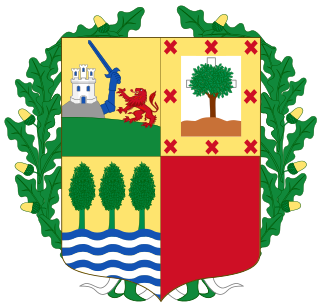
The Communist Party of Spain is a communist party that, since 1986, has been part of the United Left coalition, which is currently part of Sumar. Two of its politicians are Spanish government ministers, the Minister of Labour and Social Economy and the Minister of Youth and Children.

The Ertzaintza is the autonomous police force for the Basque Country, largely replacing the Spanish Policía Nacional and Guardia Civil. An Ertzaintza member is called an ertzaina.

The Basque Country is the name given to the home of the Basque people. The Basque Country is located in the western Pyrenees, straddling the border between France and Spain on the coast of the Bay of Biscay.

In the history of contemporary Spain, the death of caudillo Francisco Franco on 20 November 1975 marked the beginning of the Spanish transition to democracy, the establishment of the parliamentary monarchy and the subsequent accession of King Juan Carlos I to the throne. In 1978, the current Spanish Constitution of 1978 was signed and the status of Spain's autonomous entities (autonomías) was defined.

Laudio/Llodio is a town and municipality located in the province of Álava, in the Basque Country, northern Spain. Laudio is the name in Basque language and Llodio in Spanish.

Communist Unification of Spain is a political party in Spain. The group emerged around the publication Tribuna Obrera in 1968. It was constituted as UCE in 1973. Its ideological line is Marxist-Leninist and Mao Zedong Thought.

The Political Statute of the Community of the Basque Country, better known as the Ibarretxe Plan was a proposal by former lehendakari Juan Jose Ibarretxe to totally reform the Statute of Autonomy of the Basque Country by proposing a free association of the Basque Country with Spain on an equal footing, including a right to self-determination.

Aralar was a Basque socialist and separatist political party in Spain. It was opposed to the violent struggle of ETA.

The Basque Country, also called the Basque Autonomous Community, is an autonomous community in northern Spain. It includes the Basque provinces of Álava, Biscay, and Gipuzkoa. It also surrounds an enclave called Treviño, which belongs to the neighboring autonomous community of Castile and León.

The 1994 Basque regional election was held on Sunday, 23 October 1994, to elect the 5th Parliament of the Basque Autonomous Community. All 75 seats in the Parliament were up for election.

The City Council of San Sebastián is the institution that governs the Basque city of San Sebastián (Spain). Its premises are located in the former casino of the city next to the Bay of La Concha.

Amaiur was a left-wing Basque nationalist and separatist political coalition from the Basque Country and Navarre. The name of the coalition comes from the fortress of Amaiur in Navarre, which was one of the last Basque strongholds during the Spanish conquest of Iberian Navarre.

The 2012 Basque regional election was held on Sunday, 21 October 2012, to elect the 10th Parliament of the Basque Autonomous Community. All 75 seats in the Parliament were up for election. The election was held simultaneously with a regional election in Galicia. Lehendakari Patxi López announced the parliament's dissolution half a year ahead of schedule as a result of the People's Party (PP) withdrawing their support from his government, prompting Galician president Alberto Núñez Feijóo, who had been scheduling a snap election in Galicia to be held at some point throughout late 2012, to make his decision to have a simultaneous vote.
EH Bildu, short for Euskal Herria Bildu, is a left-wing, Basque nationalist and pro-independence political party and a federation of political parties in Spain. It is the main political force of the abertzale left in Spain. EH Bildu is active in the Spanish autonomous communities of Basque Country and Navarre and in the Treviño enclave of the Burgos Province.

Abertzale left is a term used to refer to the parties or organizations of the Basque nationalist/separatist left, stretching from democratic socialism to communism.
The Revolutionary Workers' Party is a Spanish far-left group. It was founded in 1974 as the radical Anti-Francoist Revolutionary Workers' Party of Spain, a name that it kept up until 1983. This group was mainly active in the Barcelona area. Since 1998, the POR is part of United Left (IU) through the internal group known as Redes.
Alternatiba may refer to:
Anticapitalistas, known as Izquierda Anticapitalista until January 2015 and as Espacio Alternativo from 1995 to November 2008, is a socialist political organisation that works as a confederation in Spain. Anticapitalistas is defined as a revolutionary socialism, anti-capitalist, proletarian internationalist, feminist, republican, and eco-socialist organisation, assuming Marxism in an open, plural, and critical sense. Its stated objective is the rebuilding of the revolutionary project through the creation of a unitary, anti-capitalist political expression sustained by the anti-globalisation movement, the labor movement, and the social movements at large. It is a member of the Fourth International (post-reunification), a Trotskyist international organisation reformed in 1963.

Ezker Anitza is the Basque federation of United Left. The party was established in January 2012 after United Left–Greens (EB–B) was disenfranchised as IU's referent in the Basque Country. Isabel Salud is the current General Coordinator.

Oskar Matute García de Jalón is a Spanish politician and a member of the Congress of Deputies of Spain. He was previously a member of the Basque Parliament.














